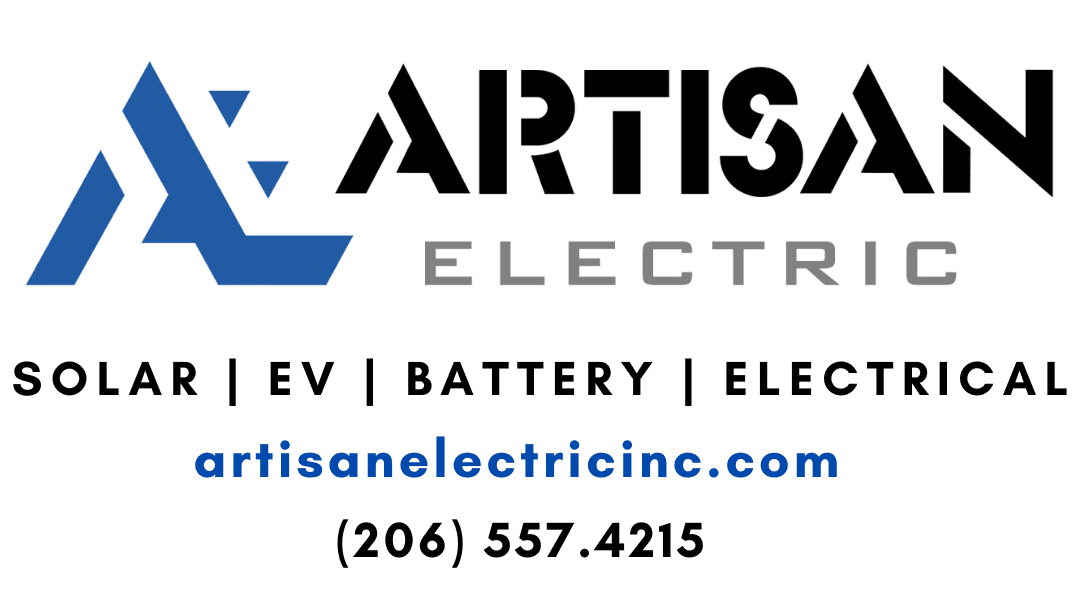If you’re considering solar energy, the choice between leasing vs buying solar panels can significantly affect your finances and future energy costs. This straightforward comparison will lay out the costs, benefits, and constraints of both options, helping you discern which path aligns with your financial and environmental priorities. Dive into our fact-based analysis to find out which solar investment strategy makes the most sense for your situation.
Key Takeaways
- Initial costs for buying solar panels are high (up to $60,000), but ownership comes with benefits like increased property value and eligibility for various incentives, including a 30% federal tax credit.
- Leasing solar panels offers low upfront costs with affordable monthly payments, but it might result in lower financial savings over time due to escalator clauses, and lessees miss out on tax benefits reserved for owners.
- Owning solar panels can boost your home’s resale value and provide a good return on investment, while leasing can complicate property sales due to lease transfer issues.
Navigating Solar Panel Acquisition: Lease Versus Purchase
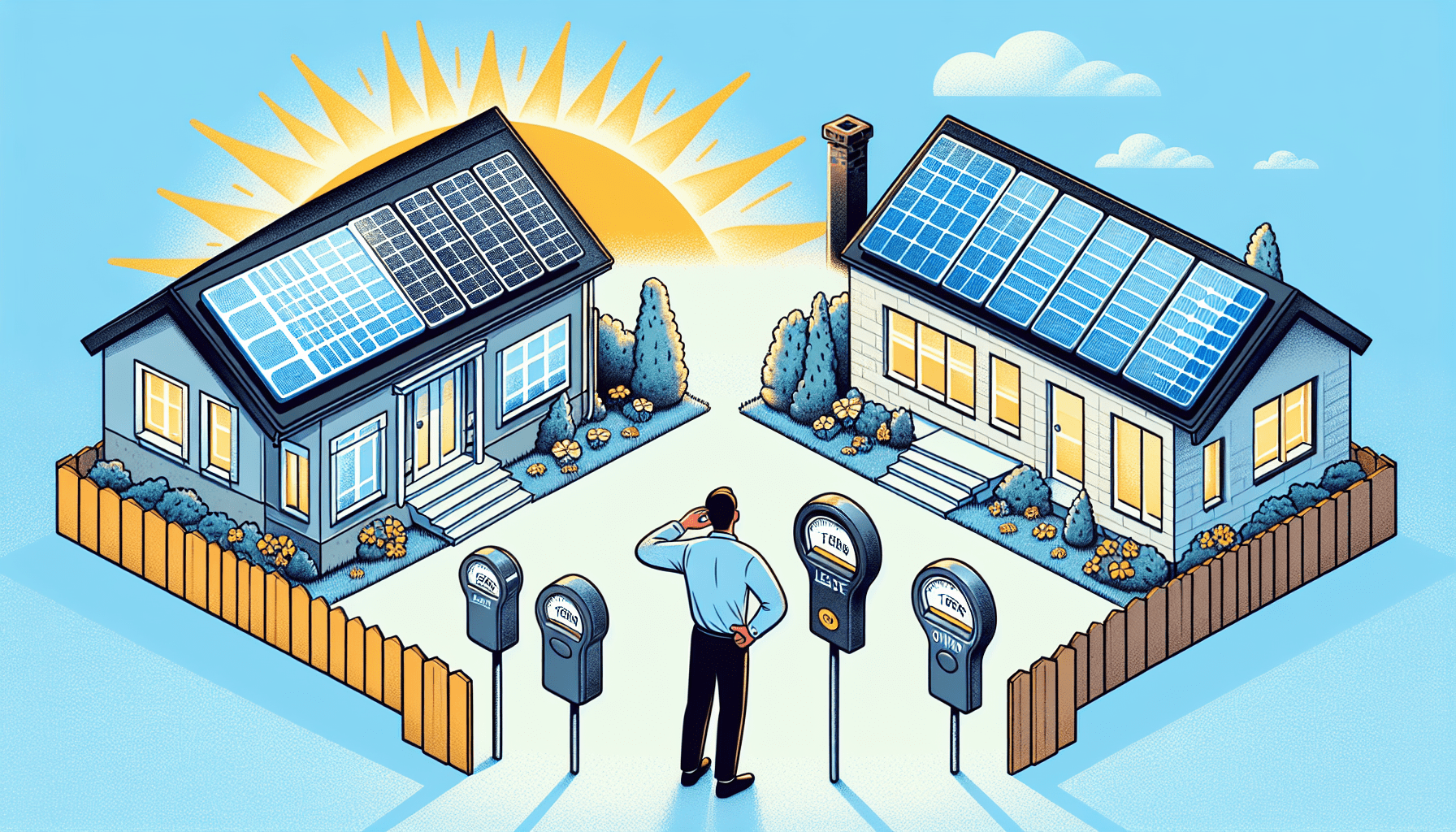
The road to solar power is paved with decisions, the foremost being the choice between leasing and buying solar panels. It’s a choice between short-term affordability and long-term financial benefits, between renting and owning, between a monthly lease and an upfront investment. Each path has its merits, its costs, and its ideal traveler.
To help you navigate this crossroads, let’s delve into the specifics and compare these two routes side by side.
Initial Costs and Financial Planning
The journey to solar begins with a financial commitment. Buying solar panels demands a significant upfront investment, with solar panels cost ranging from $18,500 to $60,000, incorporating both the cost of solar panels and installation fees. It’s a steep climb, but there’s a silver lining. Payment plans can alleviate this expense, and state or manufacturer credits might lighten the load.
Conversely, leasing solar panels offers a gentler ascent. With little to no initial cost, it makes solar energy attainable even for those with limited means. However, remember that the climb doesn’t end here. Monthly payments, typically ranging from $50 to $250, lie ahead.
Owning Your Solar System: Advantages and Considerations
Ownership comes with its share of sunshine and shadows. When you buy solar panels, you’re investing in a tangible asset that increases your property’s value. More than that, you’re eligible for various incentives including a 30% federal solar tax credit and potential state, local, or installer incentives.
But, with ownership comes responsibility. Maintenance and monitoring of the solar system fall under your purview, including all costs associated with repairs and upkeep. So, while the sun shines brightly on homeowners, it’s important to consider if you’re ready for the responsibilities that come with the rays.
The Flexibility of Leasing: Understanding the Terms
Leasing is the more flexible sibling of buying. It offers an affordable entry into the world of solar power with contracts that typically span 20 to 25 years. You can choose between fixed monthly leases and Power Purchase Agreements (PPAs), where you pay for the power generated by the system. Such agreements often include an escalator clause, specifying a set percentage increase in monthly payments, typically around 3%.
This flexibility, however, comes at a cost. Over time, an escalator clause can lead to higher lease payments, reducing your savings if electricity costs don’t rise as expected.
Long-Term Solar Savings: A Comparative Analysis
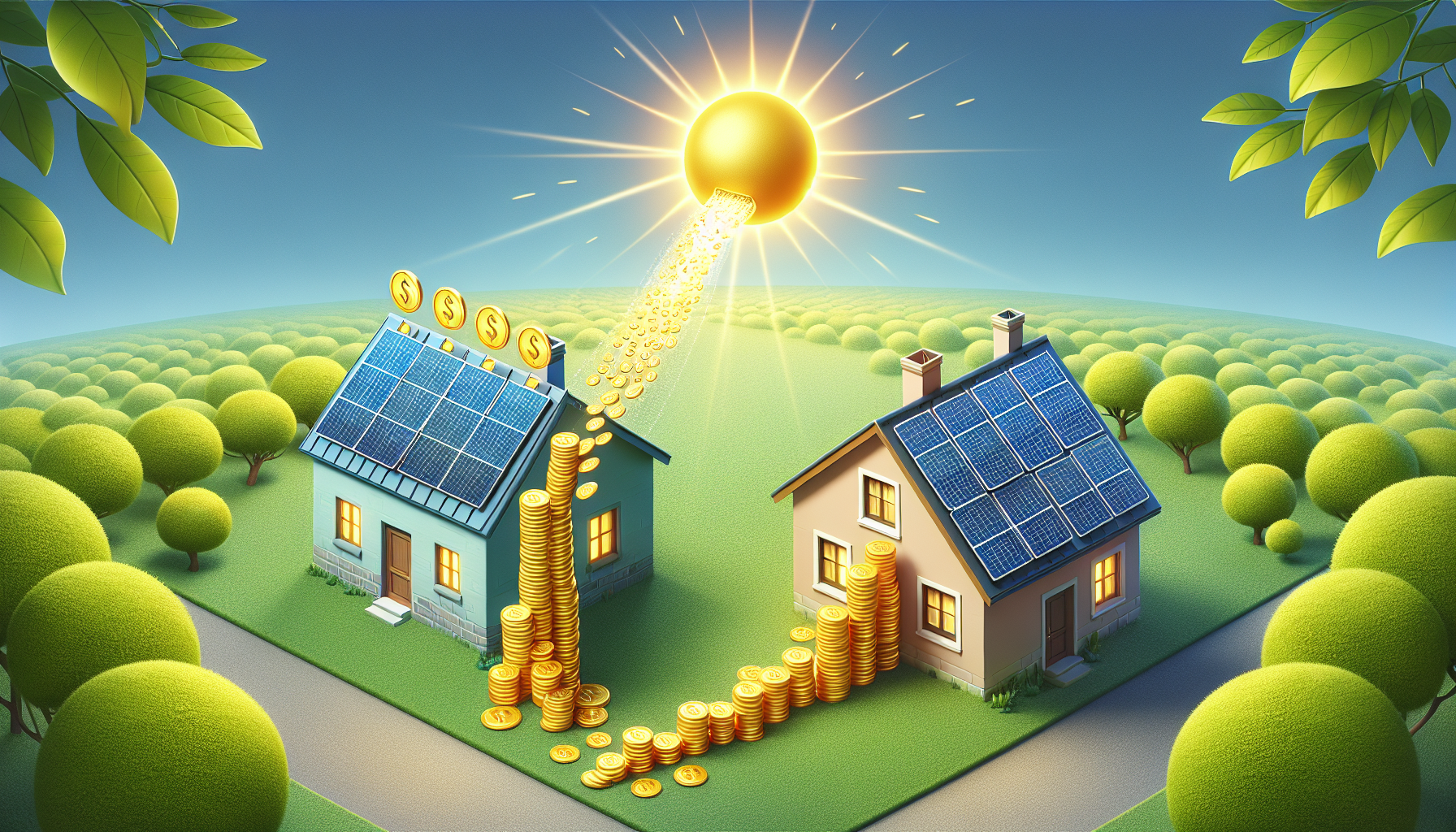
Now that we’ve navigated the initial costs and terms, let’s turn our gaze to the horizon. How do these choices pan out in the long run? Beyond the monthly payments and tax credits, how much can you really save by going solar? Let’s crunch the numbers and compare the long-term financial outcomes of leasing versus buying solar panels.
Projected Energy Bill Reduction Over Time
The promise of solar power lies in its potential to reduce energy bills. Consider this: households with a 6-kilowatt solar power system typically save around $1,500 per year or $125 per month on their energy bills. If you buy solar panels in cash, you could potentially eliminate monthly electrical bills altogether.
On the other hand, leasing solar panels can also lead to savings on your utility bill. Yet, the magnitude of these savings varies based on your monthly payments and the terms of your lease.
Evaluating Return on Investment for Purchased Solar Systems
The true value of an investment lies in its return. When you buy solar panels with cash, you avoid interest payments on loans and escalating payments on leases. This could potentially lower your overall cost and lead to immediate monthly utility bill savings. A solar panel system purchase can yield an estimated 10% return on investment in the US, equating to an average profit of $10 for every $100 spent on the system.
With their approximate 25-year lifespan, solar panels ensure extended savings beyond the initial investment period. So, while the initial investment may be steep, the long-term benefits can make the climb worthwhile.
Assessing Solar Lease Savings
Leasing, on the other hand, paints a different financial picture. While it offers a cost-effective entry into solar power, it often leads to less financial savings in the long run compared to purchasing. Solar leases usually include a price escalator clause, which can lead to higher lease payments each year, reducing savings if electricity costs don’t rise as expected.
Moreover, homeowners may still face partial energy bills aside from their lease payments, depending on solar production and household energy consumption. So, while leasing may be light on the wallet initially, it can weigh heavier in the long run.
Tax Incentives and Solar Credits: Maximizing Your Benefits
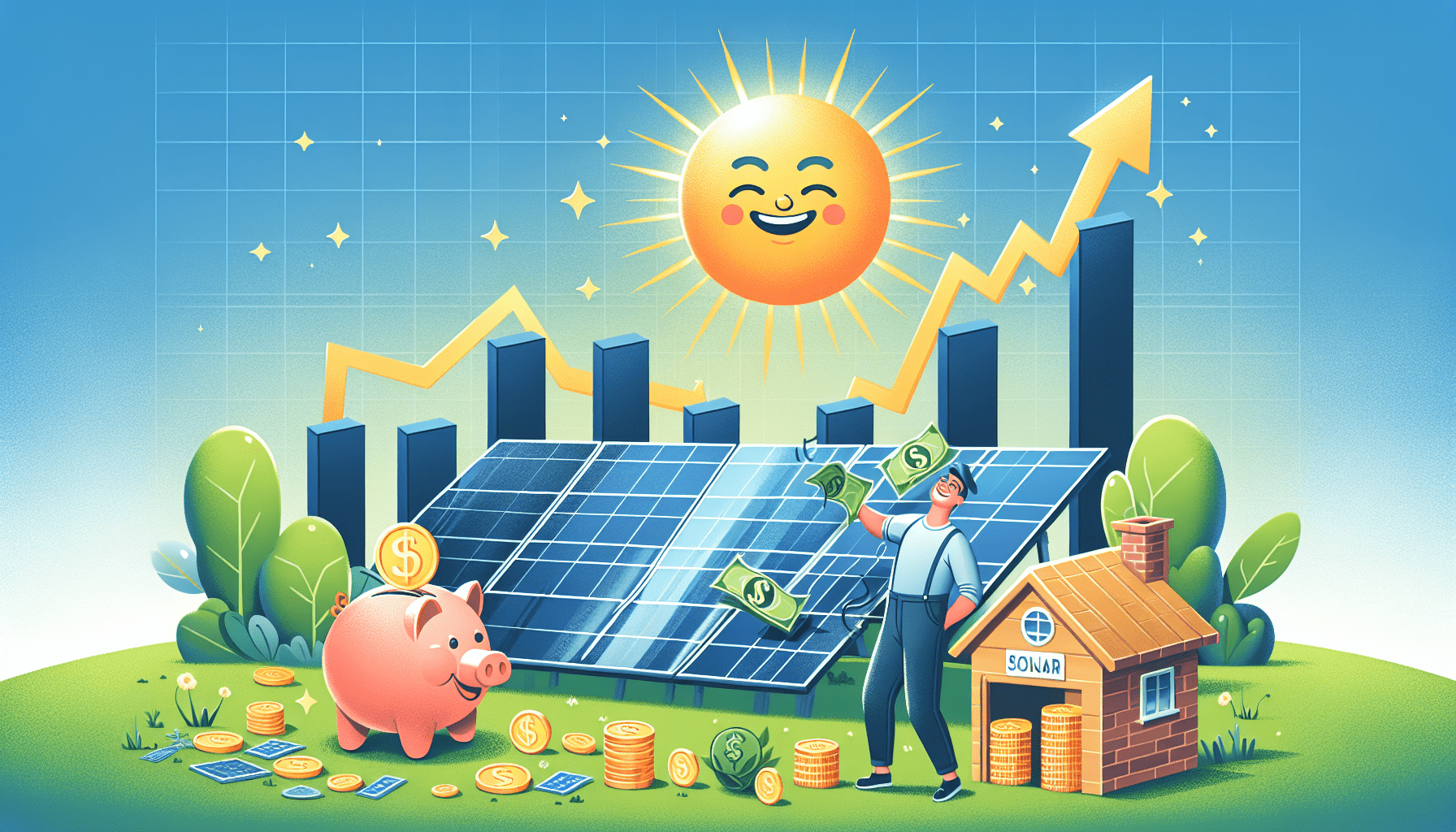
Beyond the costs and savings, there’s another financial facet to consider: tax incentives and solar credits. Governments and manufacturers offer various incentives to encourage the adoption of solar power. Yet, not all solar enthusiasts can reap these benefits. When choosing between leasing and buying, don’t miss out on solar incentives in Seattle to reduce costs.
Let’s explore these incentives and how they can impact the lease versus buy decision.
Harnessing the Federal Solar Tax Credit
The federal solar tax credit, also known as the Investment Tax Credit (ITC), offers a 30% deduction on the total cost of the solar PV system, including:
- solar panel modules
- labor
- wiring
- inverters
- mounting equipment
- solar batteries with a 3 kWh capacity or greater
- sales tax on these expenses
This significant deduction can drastically reduce the cost of solar panels, enhancing the savings potential and shortening the typical solar panel payback period of eight to 13 years.
However, to harness this benefit, you need to install solar panels and own them.
State and Local Solar Incentives
Beyond federal incentives, state and local governments offer their own solar incentives. These can include:
- Tax credits
- Rebates
- Property tax exemptions
- Sales tax exemptions
These incentives vary depending on the state and can significantly enhance the affordability of solar panels when paired with the federal credit.
Yet, like the federal tax credit, these benefits are typically reserved for solar panel owners.
SRECs and Other Performance-Based Incentives
For solar panel owners, the benefits don’t stop at tax credits. Homeowners can also earn Solar Renewable Energy Certificates (SRECs) for the electricity their solar panels produce. These credits can be sold to utility companies in states that have an SREC market, creating an additional revenue stream. Again, the key to unlocking these benefits is ownership of the solar panels.
Transitioning Property Ownership with Solar Panels
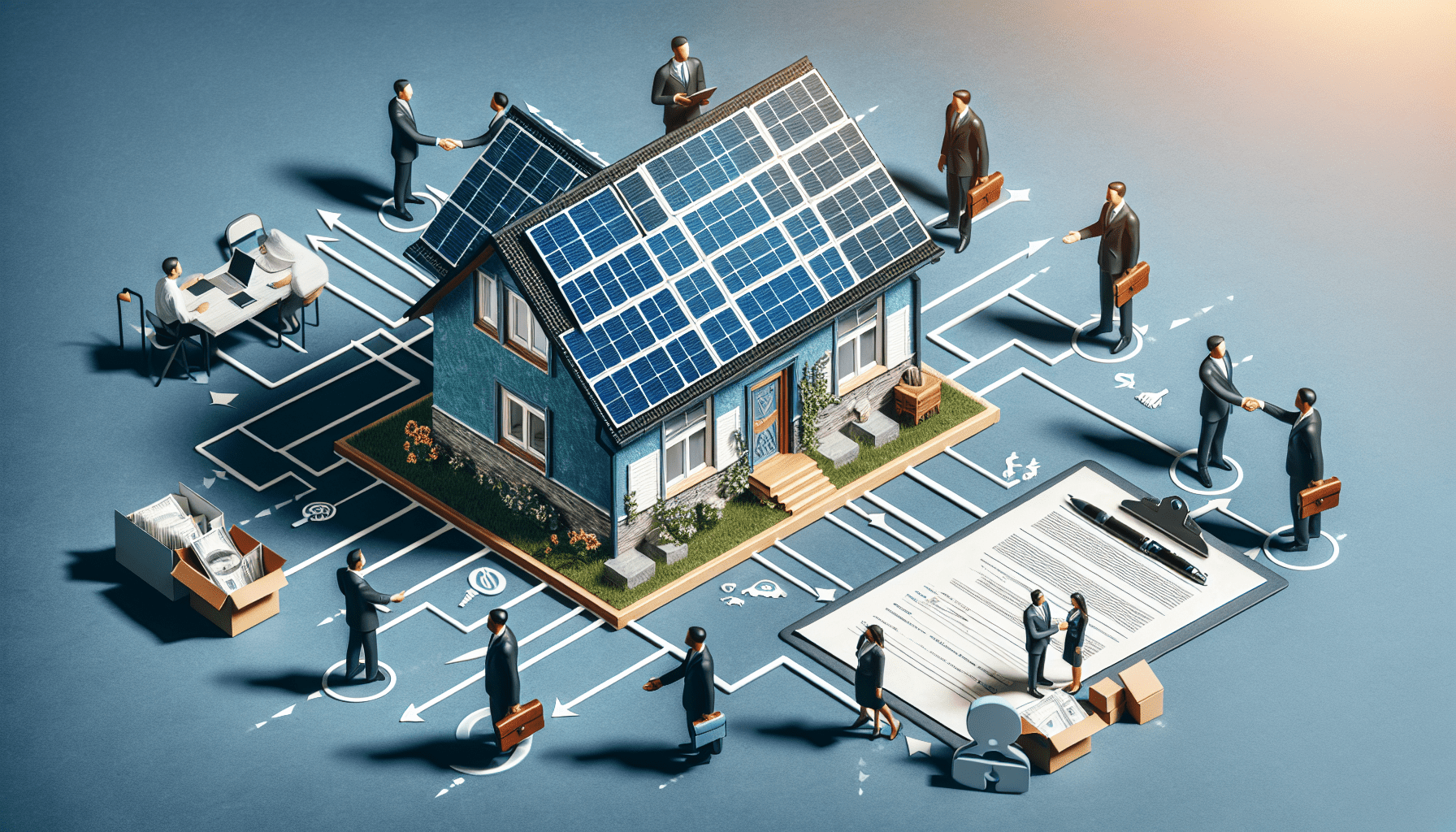
Solar panels can illuminate your home, but can they brighten your property’s appeal? Let’s explore the implications of having solar panels when you decide to sell your home. Whether you lease or buy your solar panels can significantly impact the selling process.
Selling a Home with Leased Solar Panels
Selling a home with leased solar panels can be a complex affair. As the seller, you’re responsible for initiating the transfer to the buyer, who needs to agree to the ownership transfer and set up new lease payments. Furthermore, the complexities involved in assuming lease obligations or the potential removal of panels at the end of the lease can deter potential buyers.
So, while leasing may be a cost-effective entry into solar power, it can complicate your exit.
Advantages of Selling a Home with Purchased Solar Panels
On the other hand, selling a home with purchased solar panels can brighten your property’s appeal. Homes with owned solar panels can often sell for a higher price, offering an advantageous return on investment for the seller. Moreover, a property with an installed solar system that is fully owned poses no transferability issues, making it more appealing to buyers.
So, while the upfront costs of buying solar panels may be higher, it can pay off in the long run.
Financing Solar: Loans, Leases, and Power Purchase Agreements
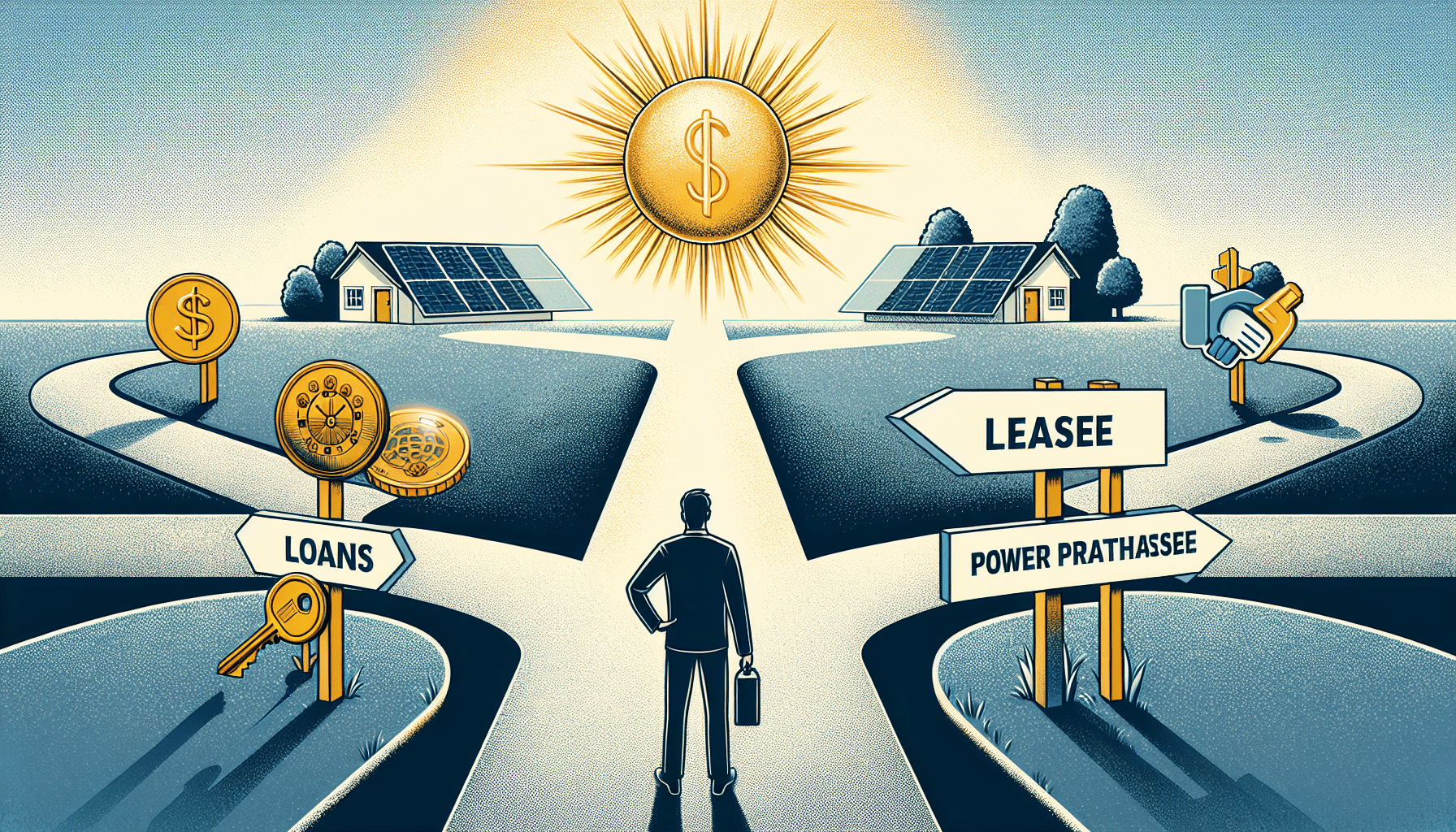
Now, let’s shine a light on the financial aspect of acquiring solar panels. From loans and leases to power purchase agreements, numerous financing options can help you harness the power of the sun. Each option presents a unique pathway to solar power, with its own implications for ownership, payments, and savings.
Exploring Solar Loan Options
Solar loans offer a path to ownership, allowing you to buy the solar system outright at the end of the loan term. These loans typically last about 20 years, but higher interest rates can prolong the payback period. From home equity loans offering low interest rates to combo loans incorporating the federal tax credit, various financial products can facilitate your journey to solar power. When considering solar loans vs other financing options, it’s essential to weigh the pros and cons of each to make the best decision for your needs.
Yet, each loan comes with its own terms and implications, such as the potential need to pay off the mortgage before selling the house.
The Structure of Solar Leases and PPAs
Solar leases and power purchase agreements offer an affordable entry into solar power. They allow homeowners to start with minimal initial investment but miss out on federal tax credits and state incentives, which typically go to the leasing company.
Leases come with fixed monthly payments or power purchase agreements, where you pay for the power generated by the system. So, while these agreements offer a cost-effective start, they may limit your long-term savings potential.
Artisan Electric’s Approach to Solar Solutions
As we navigate the solar landscape, let’s turn the attention to us: Artisan Electric, a leading solar company. Specializing in solar installation in Seattle, WA, we set industry standards for quality. As a professional solar installer, our full-service turn-key approach ensures a seamless transition to solar power.
Comprehensive Warranty and Service Guarantee
Artisan Electric’s commitment to quality shines through our comprehensive warranty and service guarantee. We provide:
- A 25-year production guarantee
- A 25-year workmanship warranty on our solar panel installations
- Manufacturer warranties that can last up to 30 years for the solar products they install.
With Artisan Electric, you can bask in the sun’s rays, assured of their quality and service.
Specialized Tesla Products and Installation
In addition to solar solutions, our expertise applies somewhere else: Tesla product installations. As Washington State’s first certified installer of the Tesla Solar Roof, we offer specialized services in this area. The Tesla Solar Roof uniquely combines solar cells with conventional roofing materials for an integrated, seamless installation.
So, whether you’re looking to harness solar power or electrify your ride, Artisan Electric lights the way.
Summary
In the journey to solar power, the decision to lease or buy solar panels is a pivotal crossroad. It’s a choice that influences your initial costs, long-term savings, and eligibility for incentives. It’s a choice between renting and owning, between monthly payments and an upfront investment. It’s a choice that can brighten your home and your property’s appeal. So, as you stand at this crossroad, remember: the sun shines on those who make informed decisions.
Frequently Asked Questions
What are the financial advantages of buying solar panels?
Buying solar panels can provide financial advantages such as eligibility for federal tax credits, potential state or local incentives, and an increase in your property’s value. So, it’s a smart investment to consider.
What are the benefits of leasing solar panels?
Leasing solar panels is beneficial because it provides an affordable way to access solar power with minimal upfront costs and flexible payment options.
What are the long-term financial outcomes of leasing versus buying solar panels?
Buying solar panels can result in greater long-term financial benefits, including reduced energy bills and potential tax incentives, compared to leasing, which may result in fewer savings in the long run.
How does selling a home with solar panels work?
When selling a home with solar panels, it’s important to consider whether the panels are leased or owned. Leased panels require a transfer process, while owned panels can increase the home’s value without transferability issues.
What services does Artisan Electric provide?
Artisan Electric specializes in providing solar panel installation services and also offers installation for a range of Tesla products, backed by a comprehensive warranty and service guarantee.
